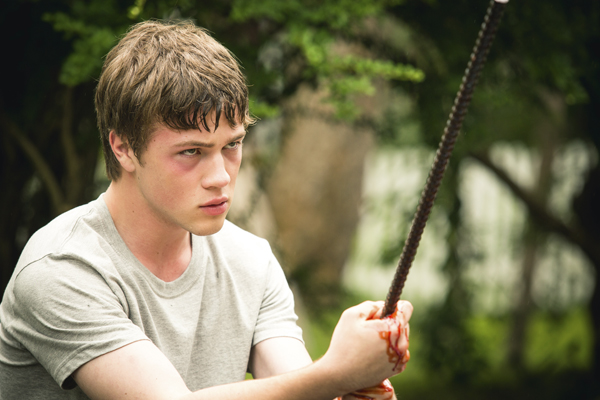Canadian writer-director Stephen Dunn’s first feature film offers a fresh take on that endangered genre—the coming-out tale. How does Dunn pull that off? By crafting a film that is a hybrid of genres. He culls from children’s films and family and teen angst dramas, and, most impressively, he consistently lifts from the genre of horror.
In the film’s prologue, Oscar Madly, as a kid, witnesses a group of teenagers assaulting a classmate, yelling homophobic slurs at him and injuring him in a gruesome manner that will haunt Oscar into his teen ages. Now a senior in high school, Oscar (Connor Jessup) splits his time between his divorced parents’ homes. He floats in and out at his mother’s house, virtually unnoticed by her and her new family. Oscar and his father, Peter (Aaron Abrams, TV’s Blindspot and Hannibal), seem to get along better. The two have spent years outfitting their house with lifts and intricate tunnels to give Oscar’s hamster, Buffy, an expansive playground.
A horror film buff, the teen aspires to be a photographer and has his sights set on an arts school in New York City, where he and his best friend, Gemma (Sofia Banzhaf), are planning to move after graduation. Most of Oscar’s photography portfolio is of her made up in monster makeup. They are close, but Peter has made the mistake of assuming Gemma is his son’s girlfriend. Enter Wilder, the new French-Canadian boy in town with tattoos and a blasé approach to life who Oscar becomes instantly attracted to, but he can’t quite figure out whether Wilder is actually flirting with him or not.
Now, back to the hamster, Buffy. Oscar talks to her, and she speaks back (voiced in a playful, droll manner by Isabella Rossellini). Oscar has had Buffy since he was a child when his mother moved out, so ever since Buffy has filled the maternal role the boy has been lacking. Now at this stage in his life, Buffy represents his clinging to childhood, and this struggle is also reflected in his photography. While Oscar is multitalented, his work lacks maturity. However, this habit of talking to the hamster may also be symptomatic of some mental instability.
Throughout, Peter makes casual homophobic comments and has made the assumption that Oscar is straight. To Peter, gay people are a form of “other,” something that simply doesn’t occur in his family. Oscar feels the pressure coming from his father, which carries over to his own expectations of himself. Whenever Oscar comes close to expressing his sexuality, like when he’s with Wilder, the images of the gay bashing he witnessed as a child come flooding back to him. Living under the same roof as a man who is prone to violent outbursts and uses gay slurs, Oscar fears if he were to tell Peter he is gay, he may be subjecting himself to the same violence that gives him nightmares.
Jessup (American Crime, Falling Skies) is effective as the angst-ridden Oscar, a kid who is talented in his own right, but since he hides so much from others, his interactions with his peers are generally awkward. Aliocha Schneider also stands out as Wilder, the object of Oscar’s affection. (Notice their names put together make “Oscar Wilder.”)
Wilder is the sexy bad-boy who drifts into town only to cause trouble. He gets Oscar to smoke pot at work at a big-box store and invites him to a costumed rave party, where they take ecstasy. Wilder, being a little more worldly than Oscar, can tell that Oscar is gay, and relishes tantalizing him every chance he can get. Because we don’t know for sure if Wilder is gay, too, writer-director Dunn could have gone many ways with this relationship, and the way it resolves is as special as it is surprising.
The spectacle of Dunn’s film is how it works as a hybrid. It’s funny yet gloomy. It’s depressing yet heartwarming. It’s sexy but also scary. There’s a creepiness to everything that goes on inside Oscar’s imagination, creating anticipation on whether the movie is going to tilt over the edge into full-on horror. Its well-blended mixture of genres, cast of talented up-and-comers, and killer soundtrack make Closet Monster stand out.

















Leave A Comment